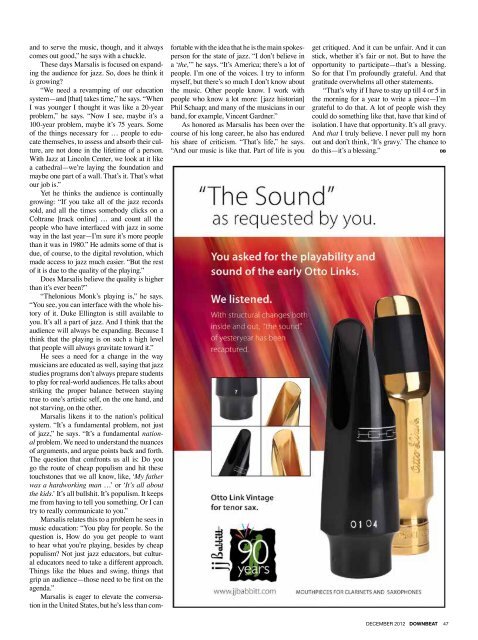Ron Carter Esperanza Spalding - Downbeat
Ron Carter Esperanza Spalding - Downbeat
Ron Carter Esperanza Spalding - Downbeat
You also want an ePaper? Increase the reach of your titles
YUMPU automatically turns print PDFs into web optimized ePapers that Google loves.
and to serve the music, though, and it always<br />
comes out good,” he says with a chuckle.<br />
These days Marsalis is focused on expanding<br />
the audience for jazz. So, does he think it<br />
is growing?<br />
“We need a revamping of our education<br />
system—and [that] takes time,” he says. “When<br />
I was younger I thought it was like a 20-year<br />
problem,” he says. “Now I see, maybe it’s a<br />
100-year problem, maybe it’s 75 years. Some<br />
of the things necessary for … people to educate<br />
themselves, to assess and absorb their culture,<br />
are not done in the lifetime of a person.<br />
With Jazz at Lincoln Center, we look at it like<br />
a cathedral—we’re laying the foundation and<br />
maybe one part of a wall. That’s it. That’s what<br />
our job is.”<br />
Yet he thinks the audience is continually<br />
growing: “If you take all of the jazz records<br />
sold, and all the times somebody clicks on a<br />
Coltrane [track online] … and count all the<br />
people who have interfaced with jazz in some<br />
way in the last year—I’m sure it’s more people<br />
than it was in 1980.” He admits some of that is<br />
due, of course, to the digital revolution, which<br />
made access to jazz much easier. “But the rest<br />
of it is due to the quality of the playing.”<br />
Does Marsalis believe the quality is higher<br />
than it’s ever been?”<br />
“Thelonious Monk’s playing is,” he says.<br />
“You see, you can interface with the whole history<br />
of it. Duke Ellington is still available to<br />
you. It’s all a part of jazz. And I think that the<br />
audience will always be expanding. Because I<br />
think that the playing is on such a high level<br />
that people will always gravitate toward it.”<br />
He sees a need for a change in the way<br />
musicians are educated as well, saying that jazz<br />
studies programs don’t always prepare students<br />
to play for real-world audiences. He talks about<br />
striking the proper balance between staying<br />
true to one’s artistic self, on the one hand, and<br />
not starving, on the other.<br />
Marsalis likens it to the nation’s political<br />
system. “It’s a fundamental problem, not just<br />
of jazz,” he says. “It’s a fundamental national<br />
problem. We need to understand the nuances<br />
of arguments, and argue points back and forth.<br />
The question that confronts us all is: Do you<br />
go the route of cheap populism and hit these<br />
touchstones that we all know, like, ‘My father<br />
was a hardworking man …’ or ‘It’s all about<br />
the kids.’ It’s all bullshit. It’s populism. It keeps<br />
me from having to tell you something. Or I can<br />
try to really communicate to you.”<br />
Marsalis relates this to a problem he sees in<br />
music education: “You play for people. So the<br />
question is, How do you get people to want<br />
to hear what you’re playing, besides by cheap<br />
populism? Not just jazz educators, but cultural<br />
educators need to take a different approach.<br />
Things like the blues and swing, things that<br />
grip an audience—those need to be first on the<br />
agenda.”<br />
Marsalis is eager to elevate the conversation<br />
in the United States, but he’s less than comfortable<br />
with the idea that he is the main spokesperson<br />
for the state of jazz. “I don’t believe in<br />
a ‘the,’” he says. “It’s America; there’s a lot of<br />
people. I’m one of the voices. I try to inform<br />
myself, but there’s so much I don’t know about<br />
the music. Other people know. I work with<br />
people who know a lot more: [jazz historian]<br />
Phil Schaap; and many of the musicians in our<br />
band, for example, Vincent Gardner.”<br />
As honored as Marsalis has been over the<br />
course of his long career, he also has endured<br />
his share of criticism. “That’s life,” he says.<br />
“And our music is like that. Part of life is you<br />
get critiqued. And it can be unfair. And it can<br />
stick, whether it’s fair or not. But to have the<br />
opportunity to participate—that’s a blessing.<br />
So for that I’m profoundly grateful. And that<br />
gratitude overwhelms all other statements.<br />
“That’s why if I have to stay up till 4 or 5 in<br />
the morning for a year to write a piece—I’m<br />
grateful to do that. A lot of people wish they<br />
could do something like that, have that kind of<br />
isolation. I have that opportunity. It’s all gravy.<br />
And that I truly believe. I never pull my horn<br />
out and don’t think, ‘It’s gravy.’ The chance to<br />
do this—it’s a blessing.” DB<br />
DECEMBER 2012 DOWNBEAT 47
















